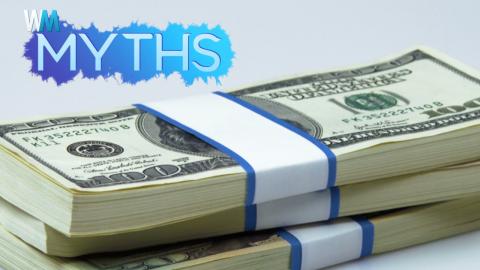Top 5 Money Myths

Let's make some paper, people. Welcome to WatchMojo's Top 5 Myths, the series that finds the biggest myths people actually believe and dispels them one by one. In today's installment, we'll be looking at the 5 myths about money that left us bankrupt. We'll be covering Money in its many wonderful forms: be it in your wallet, the stock market, or the bank.
Special thanks to our users Drew Boxall for submitting the idea using our interactive suggestion tool at http://www.WatchMojo.comsuggest
https://www.youtube.com/watch?v=ixaS1h3w9sY
- Top 5 Myths About Money
- Myth #5: A Penny Costs 8 Times as Much as it is Worth to Make
- Myth #4: Savings Accounts Eliminate the Possibility of Losing Money
- Myth #3: Earning More Money May Result in Less Net Income Due to Tax Brackets
- Myth #2: Trading Stocks is Just Like Gambling
- Myth #1: The U.S. Owes China so Much Debt that China owns them
Top 5 Myths About Money
Let’s make some paper, people. Welcome to WatchMojo’s Top 5 Myths, the series that finds the biggest myths people actually believe and dispels them one by one. In today’s installment, we’ll be looking at the 5 myths about money that left us bankrupt.
We’ll be covering Money in its many wonderful forms: be it in your wallet, the stock market, or the bank.
Myth #5: A Penny Costs 8 Times as Much as it is Worth to Make
Most of us can agree that the penny is good for few things outside of wishing wells and paying off parking tickets.
But common knowledge has somehow grown to accept the notion that our Lincoln friend costs 8 times as much as it’s worth to produce.
Zinc, and to a lesser extent copper, makeup the primary costs of manufacturing a penny, and depending on the going rate for these items, it may very well cost a cent or two more to produce.
In theory however, this all evens out when metals costs are low. What’s more, the circulation of a single penny far surpasses its singular cost of creation.
So, If you’ve ever considered a career in melting down pennies for their precious metals, keep in mind that it’s not only illegal, but also far less profitable than you may think.
Myth #4: Savings Accounts Eliminate the Possibility of Losing Money
The economy has been quite rocky in recent years with the 2008 housing bubble, and being skeptical of the stock market is hardly unreasonable given its uncertainty.
However, just because it’s guaranteed that you’ll avoid losing your money overnight, doesn’t mean that savings accounts gain, or even maintain their value.
Interest rates are notoriously low for savings accounts given their risk-free nature.
You’d be hard-pressed to find an annual interest rate above 1%, while inflation fluctuates between 1.5% to over 3% on any given year.
Money is a relative concept, so a higher inflation rate means a lower level of relative wealth in the long run.
We’re not suggesting you go out and invest in the next Enron, but if you’re not moving forward you’re moving backwards as they say.
Myth #3: Earning More Money May Result in Less Net Income Due to Tax Brackets
So the bossman’s finally given out that raise you’ve been working towards, but after careful analysis it comes to your attention that your new tax bracket is 10% higher than before.
Believe it or not, this in no way puts you in danger of earning less; or even a comparable amount to your earnings before.
The majority of countries operate under what’s known as a marginal tax rate.
In the U.S. for example, a single tax filer pays 10% on their first $9,225, 15% on any earnings after that until $37,450, and the pattern continues until roughly 40% is given on all earnings above $413,201.
So don’t turn your nose up at that lovely bonus.
Myth #2: Trading Stocks is Just Like Gambling
Vegas, E-trade… they’re more or less the same thing, right?
Well, in theory, the stock market can be treated like a roulette table, but any broker with this mentality will find themselves out of a job, if not also under scrutiny of the law after losing all their clients’ money.
A major difference between the two is their end goal, with gambling acting as a zero-sum game, while investors aim to “expand the pie.”
If Apple stock goes up, both investors and the company are happy.
If you win big at the craps table, the Bellagio loses money from their pockets.
Calculated decision-making replaces emotionally-driven crapshoots in the stock market and those with addictive behaviors are swiftly weeded out of the trading floor.
Myth #1: The U.S. Owes China so Much Debt that China owns them
It’s been said in many a political debate, “China owns the U.S., and we’d hate to see what happens when they ask for their money back.”
Yes, China does hold over a trillion dollars of the United States national debt, but national debt is far more complex than a friend who owes you $600 in rent money.
The dollar is one of the safest currencies in the world, and China uses this debt to peg the yuan to the dollar.
A dollar-pegged yuan also makes their emerging market more robust internationally, which goes hand-in-hand with cheaper Chinese exports.
We’re not saying that overwhelming national debt is a good thing, but it’s certainly distorted for political rhetoric in cases such as this.
So how many of these money myths did you believe? This is what Google searchers look for when probing for money myths. Does money grow on trees? Is a dollar bill from 1957 worth anything? Does the stock market close on Good Friday? For more cash-grabbing top tens and inflationary top fives, be sure to subscribe to WatchMojo.com.
